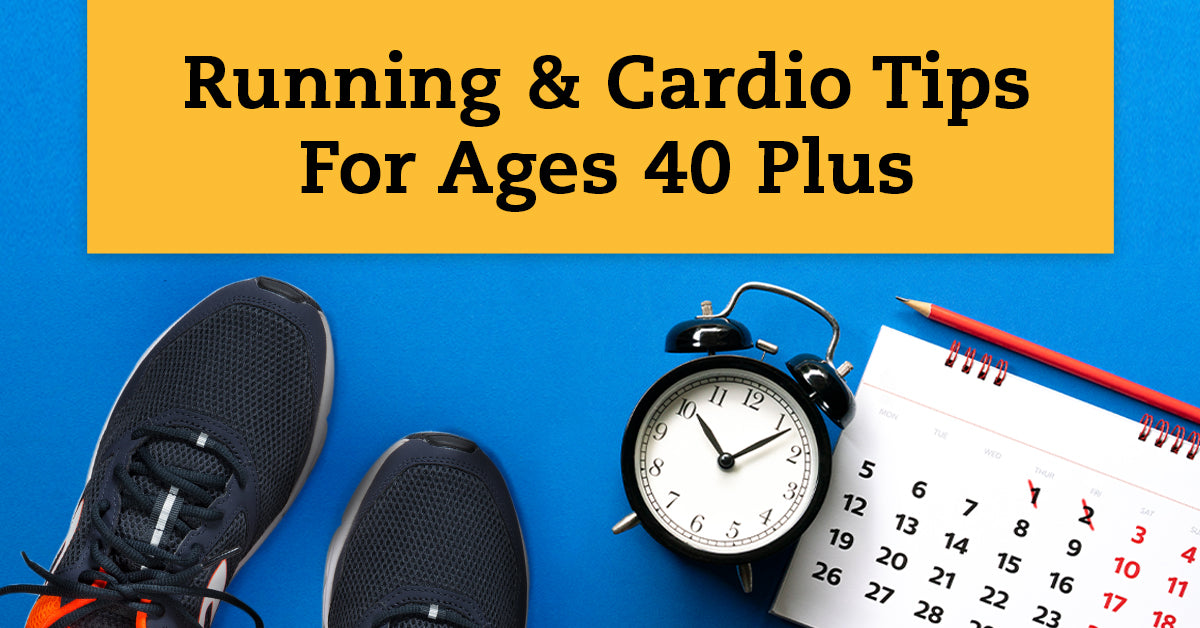The Best Tips For Cardio & Running (For Ages 40 & Above)

Running can be a great way to improve your cardiovascular fitness, and it's a particularly effective way to stay fit and strong as you grow older. But because running is so high impact and tough on your muscles and joints, it can also lead to injury if you don't adapt your training routine to suit your body's needs.
To boost post-workout muscle recovery, check out Rejuvenate’s amino acid supplements.
Prior to beginning a running schedule or program, you should have a clear understanding of the effects of aging on your body. Your physical fitness tends to peak around your 20s and 30s. Not to fret, even some professional athletes experience performance declines as they approach their 40s.
The changes you may encounter as you age include:
- Decline in cardiovascular endurance
- Shrinkage in the size and density of your bones
- Slower metabolism, which can contribute to weight gain
- Deterioration of strength and mobility
- Break down of muscle faster than you can rebuild it
How Much Should We Run As We Grow Older?
First and foremost, there isn’t an exact age that your physical fitness will decrease. You have to remember that our health is subjective to us and our lifestyles, socioeconomic factors, and genetics. But that doesn’t mean that we cannot use the same strategies and methods to combat aging and age-related muscle loss.
With that said, it’s recommended that seniors aged 65 and over should aim for at least two-and-a-half hours of moderate aerobic exercise every week. Simply walking for a half-hour a day will fulfill this requirement.
An alternative to this would be vigorous exercise, like jogging, weekly for at least an hour and fifteen minutes.
To boost your balance and flexibility, try to engage in strength training for two to three days out of the week.
How to Prep Yourself for A Run
Prior to any run, we must exercise to loosen up our muscles and create a shield of defence from the impact of the workout we may endure. Taking 5 minutes to stretch beforehand and then 5 minutes after the run can significantly improve our fitness ability and help us cool down.
Exercise routines are essential for maintaining our muscle health. Stretching helps to keep our muscles. Therefore, if you’re over the age of 50 and are not well versed in a routine, please consult your doctor.
Read More About Why Stretching Before Exercising Is Important

Did You Know Running Has No Age Limit?
Running doesn’t have an age limit; there’s this odd notion that running in marathons is restricted to younger folk. But there’s no truth to it.
Maintaining a steady running schedule in your 40s onward is incredibly beneficial to your cardiovascular health. As displayed in the 2019 New York City Marathon, thousands of runners over the age of 40 took part.
In 2019, at the New York City Marathon, there were:
- 16,362 runners between 40 and 49
- 10,173 runners between 50 and 59
- 2,714 runners between 60 and 69
- 356 runners between 70 and 79
- 24 runners between 80 and 89
In 2018, an eighty-five-year-old woman named Katherine Beiers ran the Boston Marathon. Yes, you read that correctly. It took her almost eight hours to complete the entire thing. But she did it; she didn’t let her age hold her back from competing.
Beiers, who was the oldest person registered in the race, ran the 26.2-mile marathon in the pouring rain as well. What an incredible display of human strength!
There’s even research that shows adults over the age of 65 who go for regular jogs are better set for marathons than non-runners. In other words, consistency is key.
Optimize Your Expectations to Your Lifestyle
It’s vital that, as we age, we optimize our expectations of our health. The inevitable fact is that ageing causes fitness to decrease, and therefore, we need to lessen our expectations as well.
But don’t be demotivated by that because there is evidence to prove that the effects of ageing can be reduced by engaging in consistent fitness and nutrition. Rejuvenate is clinically proven to increase your body's ability to rebuild and repair lost muscle by 57% at rest.
Practice Regular Physical Activity
It doesn’t matter what age you are, but one thing is for sure: you have to maintain a steady schedule for walking and running to build muscle strength. To do this, you should incorporate physical activity into your daily life. Work the activity into your day like:
- Climbing stairs rather than taking the elevator
- Walking to the park
- Working out lightly while watching TV
- Working on outdoor home maintenance (ex. mowing the lawn)
Remember to increase your workouts moderately, do not be sudden with this because it can lead to injury or soreness in your muscles.
Set Running Goals for Yourself
Setting goals is a great way to hold yourself accountable for running. Be realistic with them; consider your age and your experience. It’s okay to feel like you have a lot of work ahead of you; the best part is accomplishing the small goals and having a big goal like a marathon to work towards.




